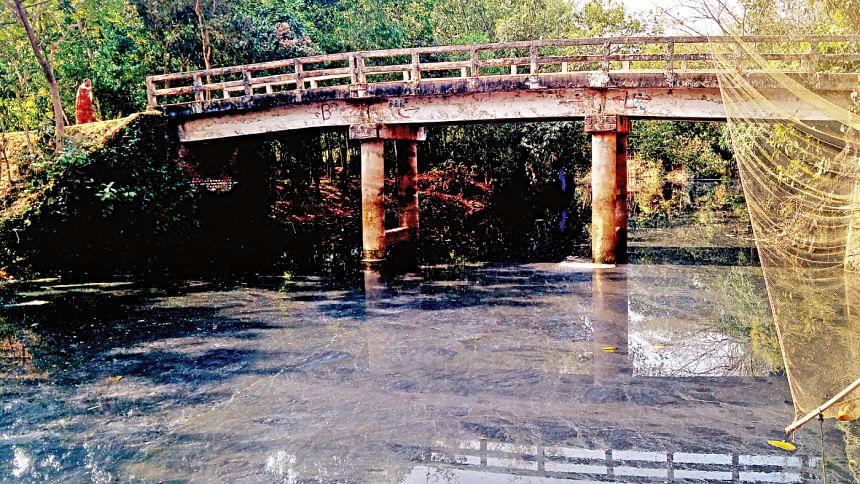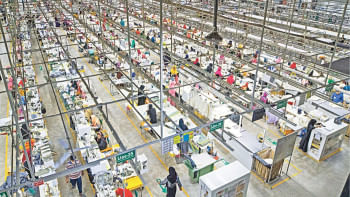Toxic water from India: environment in Akhaura at risk

Toxic industrial and medical waste and household sewage has been making its way into Bangladesh from Agartala, the capital of the Indian state of Tripura, for years through a cross-border canal putting the environment, health, and livelihoods in bordering Akhaura upazila at risk.
Bangladesh is set to raise this issue, among others, during the biannual meeting of the two countries' border forces in Dhaka on September 13-18.
"Polluted water enters Bangladesh from Agartala through Ramnagar canal. The water has been tested several times and harmful chemicals such as lead, sulphur, manganese, cadmium and chromium were found to be way beyond the safe limit," said Mominul Islam, inspector of the Department of Environment in Brahmanbaria.
"Fish resources in the canal have disappeared due to pollution," he added.
Effluent from medical institutes such as the Indira Gandhi Memorial Hospital, various dyeing, leather and melamine factories, and household sewage in Agartala, is contaminating the water, the DoE official said.
The Bangladesh part of the canal, called Senarbadi, is 15 feet wide and runs through 15 villages and also the Akhaura municipality area before the main part and two of its branches -- Jaji Khal and C & B Khal -- flow into the Titus River through different points, according to the DoE official.
The villagers who depend on Senarbadi for their lives and livelihoods are bearing the burden of this cross-border pollution.
In a recent visit to the area, this reporter saw polythene and various food packets, discarded plastic, glass bottles and other items floating in the pitch-black foul-smelling water.
People living in villages along that five-kilometre stretch of the canal have long faced innumerable sufferings due to this pollution, which worsens during the dry season, said locals.
They said they can't even use the water for irrigation, let alone for household purposes. They also said many people in these villages have been suffering from waterborne diseases.
"The Senarbadi canal was once a source of sweet water. But now we call it Kalandi [canal of black water] as its water has turned almost black due to pollution," said Abul Kalam Bhuiyan, a member of ward No 8 of Akhaura Dakkhin union.
There are around 1,500 hectares of agricultural land in these bordering villages, which depend on the canal water for irrigation in preparation for their yearly crop.
But due to excessive presence of heavy metals and other harmful chemicals in the water, the agriculture department advises the farmers not to use the water for irrigation.
Shahana Begum, Akhaura upazila agriculture officer, said, "A couple of years ago, the Soil Resources Development Institute in Dhaka found harmful chemicals in the water. Since then, during field meetings the agriculture department often requests the farmers to not use the water."
Akhaura Dakkhin Union Deputy Assistant Agriculture Officer Ziaur Rahman said nitrogen levels in the canal connected to Tripura were quite high.
"Usually from December to February, the farmers of the area draw water from the canal. But many of them complained that their paddy saplings rot during irrigation," he said.
High nitrogen levels in water used for irrigation affect plant growth and quality.
In the water body itself, it causes the growth of excess aquatic plants and algae which eventually deprive the water body of oxygen -- leading to the death of fish stocks and harming people who drink or come in contact with the contaminated water.
Akhaura UNO office sources said the toxic black water adversely impacts the environment in Sadar Dakkhin and Mugra unions of the upazila and a part of the municipality.
Md Shahnewaz, former chairman of Akhaura Dakkhin union, said people in the area are often afflicted with various skin and respiratory diseases.
Shafiqul Islam, general secretary of Import-Export Association at Akhaura land port, said, "Businessmen and people of the bordering villages have been demanding a solution to the black toxic water for long.
"But nothing has happened. Such a situation cannot continue."
In its meeting at Pilkhana tomorrow, the Border Guard Bangladesh will raise this issue with its Indian counterpart, the Border Security Force, said BGB officials.
BGB's Director (operations) Lt Col Fayzur Rahman told The Daily Star, "The entry of waste from India through Akhaura-Agartala ICP [check post] will also get priority in the talks as we have been trying hard to stop the inflow of such waste."
The official said chemical waste was flowing in via the canal even though India had been claiming that it was only human waste.

 For all latest news, follow The Daily Star's Google News channel.
For all latest news, follow The Daily Star's Google News channel. 



Comments